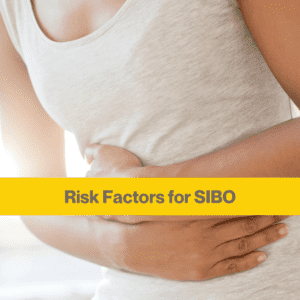If you’ve been diagnosed with SIBO, you might be wondering why it happened in the first place. Small intestinal bacterial overgrowth doesn’t occur without a reason. In fact, there are several possible root causes — and it’s often a combination of issues that leads to the overgrowth of bacteria in the small intestine.
In this article, we’ll look at the key root causes of SIBO, including problems with gut motility, low stomach acid, poor bile flow, and more.
What is SIBO?
Small intestine bacterial overgrowth (SIBO) is where microbes overgrow in your small intestine. These microbes can interfere with normal digestion and lead to symptoms such as bloating, abdominal cramps, diarrhoea, excessive gas and hypersensitivity.
What are the main root causes of SIBO?
There are a complex set of drivers for SIBO.
-
Impaired gut motility (e.g. damage to the Migrating Motor Complex)
-
Low stomach acid
-
Poor bile flow
-
Insufficient digestive enzymes
-
Structural issues in the small intestine
-
Post-infectious damage to the nerves controlling digestion
How does SIBO start?
Let’s take a look at how a breakdown in your normal digestive processes can result in bacteria colonising your small intestine. The main root causes for SIBO are:
- Bacteria build up because it’s not being cleared from the small intestine properly (e.g. slow movement)
- Bacteria aren’t being killed by our defensive mechanisms (e.g. stomach acid).
There are various ways these root causes can develop.
Slow gut motility: a root cause of SIBO
If anything slows down the passage of food through your small intestine it can be a cause of microbial overgrowth. Things that could slow down your small intestine include:
- Partial obstruction – this could be because of adhesions which stick the small intestine to other nearby organs slowing the transit of food and bacteria. Other causes include strictures, which are a narrowing of the small intestinal passage, tumours, or anything else blocking the intestine.
- Small intestine diverticula – sometimes called blind loops, these are mini bulges in the small intestine which could collect pockets of food or bacteria.
- Abdominal surgery or injuries – sometimes when scarring occurs from previous operations or accidents.
The small intestine should be a one way corridor, with no movement back upwards. This helps to keep your intestines clear of bacteria. Sometimes the ileocecal valve, which is the link from the small intestine to the large intestine, can stop working as well as it should. This means there is an opportunity for bacteria to creep from the large intestine microbiome into the small intestine.

How a faulty Migrating Motor Complex leads to SIBO
When we have finished the meal, we need to clean our kitchens. Did you know your gut has it’s own cleaner too?
Let’s get to know your migrating motor complex (MMC). The MMC is a quick impulse that moves through the first two thirds of the small intestine whenever we haven’t eaten for around 90 minutes. It will stop for around 1.5-2 hours whenever we eat.
The MMC takes around 90 minutes to clean out the small intestine, and it helps remove old bits of food, bacteria and dead cells. If this cleaning mechanism isn’t working well, you can get an overgrowth of bacteria.
Read more about the Migrating Motor Complex and how it can become damaged.
Autoimmunity after food poisoning
For many people, SIBO symptoms begin after a bout of food poisoning. You might have recovered from the acute illness — the vomiting, diarrhoea, or upset stomach — but still feel like your digestion hasn’t been the same since.
What we now understand is that certain types of bacteria that cause food poisoning (like Campylobacter, E. coli, or Salmonella) can trigger an autoimmune reaction in the gut. When your immune system attacks the bacteria, it can also mistakenly attack the cells that regulate your migrating motor complex (MMC).
This process involves the production of antibodies to a bacterial toxin called CdtB (cytolethal distending toxin B). These antibodies can also target a protein in your gut called vinculin, which plays a role in healthy nerve and muscle function.
The result? Damage to the nerves that help coordinate the MMC, reducing your gut’s ability to clear out bacteria between meals. Over time, this can lead to a build-up of microbes in the small intestine.
This post-infectious autoimmune pathway is one of the better understood root causes of SIBO, and it’s especially common in people who also meet the criteria for IBS-D (irritable bowel syndrome with diarrhoea).
You can test for this pathway with a blood test that looks for anti-CdtB and anti-vinculin antibodies, although it’s not widely available in the UK just yet. If this is a suspected root cause, treatment often involves a combination of antimicrobials and prokinetic support to help restore gut motility.
Supporting your MMC
The MMC is one of the reasons not eating too late at night is often helpful for people with digestive issues. When you have a 12-14 hour fast overnight your migrating motor complex can do its cleaning work multiple times during the night. And the best part of that is you’re asleep for most of the time, so you shouldn’t notice not eating.
Just a quick note – the speed of your food moving through your gut doesn’t change your MMC, so if your MMC is not working well, that doesn’t mean you’ll be constipated.
And in the same way the MMC doesn’t cause a bowel movement. You can have a slow MMC, but have diarrhoea or a fast transit of food.
Low stomach acid as a root cause of SIBO
One of the main purposes of your stomach acid is to kill off bacteria as they come in on your food. If you don’t have enough stomach acid you may be exposed to more pathogenic bacteria, which can move into the small intestine. This could contribute as a underlying cause of SIBO.
This could be worse if you have taken an acid suppressing medication for a long time (say longer than 6 months). Examples of this are a Proton Pump Inhibitor (PPI) or other Acid blocking medication such as a H2 (Histamine) blocker. It’s been shown that decreased stomach acid can lead to more bacteria in the stomach and the duodenum, the upper part of the small intestine.
Can gut bacteria help avoid SIBO?
Taking probiotics may help reduce the effects of taking a PPI. In particular, certain probiotic strains called Lactobacillus reuteri 17938 and a mixed Lactobacillus may help prevent SIBO when taking a PPI.
You could also consider prokinetic supplements. Prokinetics can help keep the MMC moving if you have low stomach acid, and reduce the risk for SIBO. There are medicines which do this, but also herbal supplements such as ginger.
if you’re very stressed then you can produce less stomach acid. When you are in a state of fight or flight your body doesn’t prioritize digestion. Reduced blood flow to the digestive system means you could end up with reduced stomach acid.

How poor bile flow and low enzymes contribute to SIBO
We secrete digestive bile and enzymes along the small intestine which help breakdown food we eat into nutrients which can be absorbed. When these digestive aids don’t work effectively then you could be at higher risk from SIBO.
Digestive enzymes
Some of the digestive enzymes we produce when we eat have an antibacterial effect. If you don’t produce enough proteolytic enzymes it could lead to higher levels of pathogenic microbes growing in your small intestine.
Low stomach acid can reduce digestive enzyme production.
Bile and SIBO – a forgotten root cause?
Your liver releases bile when you eat, and one of it’s main purposes is to help absorb dietary fats. The other important function of bile is to help protect the small intestine from invading microbes.
There is some evidence from mouse studies that closing the bile duct caused an greater than 10-fold increase in aerobic bacteria and a doubling of anaerobic bacteria in the small intestine. Other studies show that bile and unconjugated bile acids inhibit bacterial growth, so reduced bile may contribute to bacterial growth.
There are a few common reasons why bile flow might be reduced:
-
Liver issues, such as fatty liver or alcohol-related damage, can affect bile production.
-
Gallbladder problems, like gallstones or sluggish emptying, can reduce how much bile is released into the small intestine.
-
Very low-fat diets over time might also reduce bile flow, as fat in a meal is one of the main triggers for bile release.
When bile isn’t flowing properly, fats aren’t digested as efficiently, and bacteria that should be kept in check may start to multiply.
This is why supporting bile flow can be an important part of addressing the root causes of SIBO and improving digestion.
Why addressing your SIBO root causes matters
Getting rid of bacteria with treatment is only part of the picture. If the underlying cause of your SIBO isn’t addressed — like slow motility or low stomach acid — symptoms are likely to return.
Working with a SIBO-trained nutritionist can help you identify which root causes are most relevant for you and how to support your digestion long term.
SIBO is a complicated condition, with multiple root causes, and you need to better understand how to address these SIBO triggers to help resolve your symptoms. I recommend working with a nutritionist who has trained in SIBO for best results.
If you’d like me to help you with your digestion we can set up a free call to discuss what you’re looking for.

IBS Nutritionist
Hi, I'm Anna Mapson, registered Nutritional Therapist.
I help people with IBS and SIBO get control of unpredictable gut symptoms to find long term relief from painful and embarrassing IBS without restrictive dieting.
I can help you to:
- understand your digestion better, so you recognise your triggers
- eat a well balanced diet, with tasty meals that are simple to prepare
- reintroduce your trigger foods so you can get back to enjoying food again
Find more about my 3 month 1:1 Gut Reset programme.



SIBO diet
I would love to chat first before signing up to see what I need to do to get rid of stubborn Sibo I’ve had now for going on six years . It seems like I tried everything and worked with so many nutritionists that have not been able to heal my gut . All I believe is there has to be away to reset my gut .My gut wasn’t always like this; I know what destroyed my gut so I know there’s a a way to get back to normal. I would love to have a meeting with you. I read your article and loved how you talked about the root to Sibo . I think I focused so much on getting rid of Sibo rather than perhaps focus on getting my gut restored first to make it impossible for Sibo to continue to thrive.